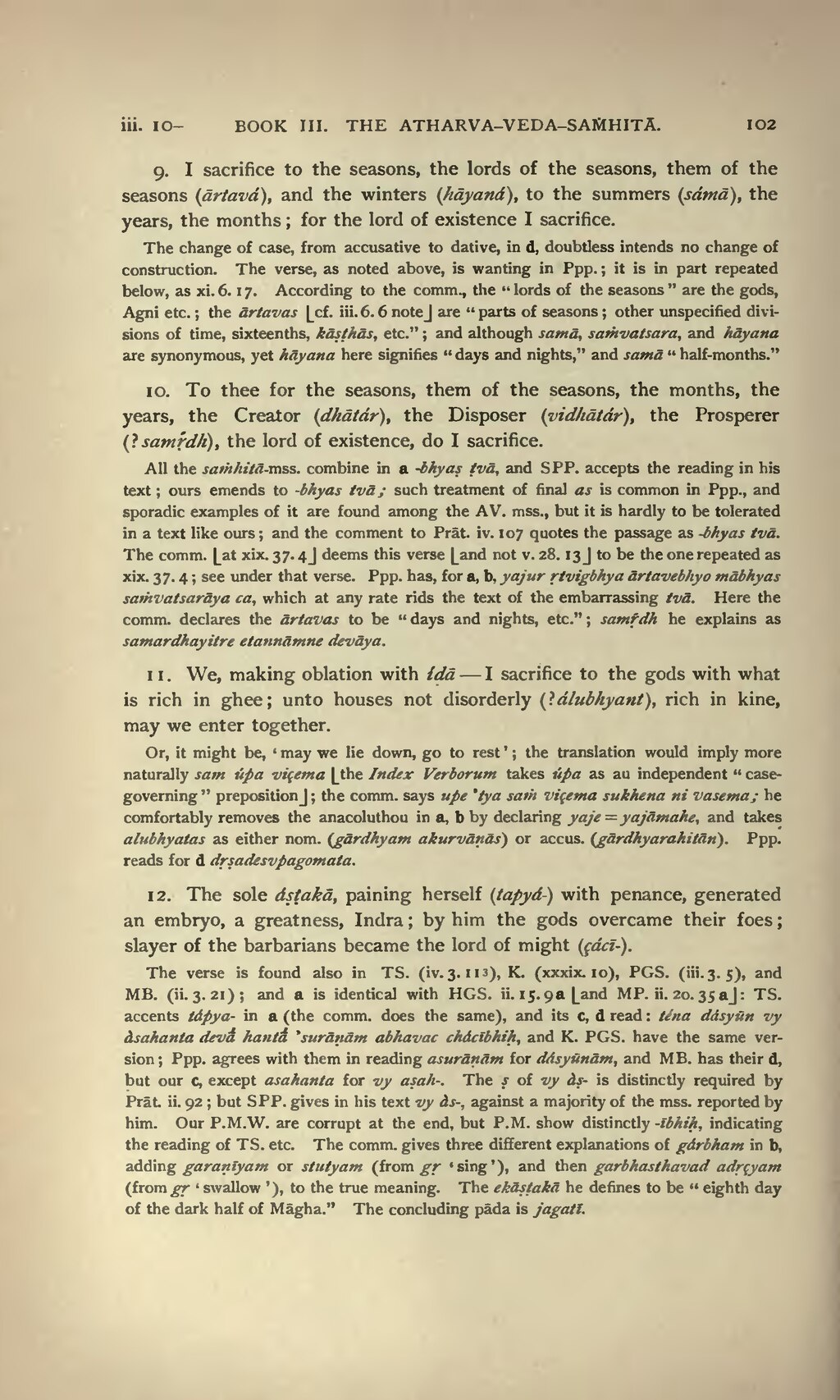9. I sacrifice to the seasons, the lords of the seasons, them of the seasons (ārtavá), and the winters (hāyaná), to the summers (sámā), the years, the months; for the lord of existence I sacrifice.
The change of case, from accusative to dative, in d, doubtless intends no change of construction. The verse, as noted above, is wanting in Ppp.; it is in part repeated below, as xi. 6. 17. According to the comm., the "lords of the seasons" are the gods, Agni etc.; the ārtavas ⌊cf. iii. 6. 6 note⌋ are "parts of seasons; other unspecified divisions of time, sixteenths, kāṣṭhās, etc."; and although samā, saṁvatsara, and hāyana are synonymous, yet hāyana here signifies "days and nights," and samā "half-months."
10. To thee for the seasons, them of the seasons, the months, the years, the Creator (dhātár), the Disposer (vidhātár), the Prosperer (? samṛ́dh), the lord of existence, do I sacrifice.
All the saṁhitā-mss. combine in a -bhyaṣ ṭvā, and SPP. accepts the reading in his text; ours emends to -bhyas tvā; such treatment of final as is common in Ppp., and sporadic examples of it are found among the AV. mss., but it is hardly to be tolerated in a text like ours; and the comment to Prāt. iv. 107 quotes the passage as -bhyas tvā. The comm. ⌊at xix. 37. 4⌋ deems this verse ⌊and not v. 28. 13⌋ to be the one repeated as xix. 37. 4; see under that verse. Ppp. has, for a, b, yajur ṛtvigbhya ārtavebhyo mābhyas saṁvatsarāya ca, which at any rate rids the text of the embarrassing tvā. Here the comm. declares the ārtavas to be "days and nights, etc."; samṛ́dh he explains as samardhayitre etannāmne devāya.
11. We, making oblation with ídā—I sacrifice to the gods with what is rich in ghee; unto houses not disorderly (? álubhyant), rich in kine, may we enter together.
Or, it might be, 'may we lie down, go to rest'; the translation would imply more naturally sam úpa viçema ⌊the Index Verborum takes úpa as an independent "case-governing" preposition⌋; the comm. says upe ’tya saṁ viçema sukhena ni vasema; he comfortably removes the anacoluthon in a, b by declaring yaje = yajāmahe, and takes alubhyatas as either nom. (gārdhyam akurvāṇās) or accus. (gārdhyarahitān). Ppp. reads for d dṛṣadesvpagomata.
12. The sole áṣṭakā, paining herself (tapyá-) with penance, generated an embryo, a greatness, Indra; by him the gods overcame their foes; slayer of the barbarians became the lord of might (çácī-).
The verse is found also in TS. (iv. 3. 113), K. (xxxix. 10), PGS. (iii. 3. 5), and MB. (ii. 3. 21); and a is identical with HGS. ii. 15.9 a ⌊and MP. ii. 20. 35 a⌋: TS. accents tápya- in a (the comm. does the same), and its c, d read: téna dásyūn vy àsahanta devā́ hantā́ ’surāṇām abhavac chácībhiḥ, and K. PGS. have the same version; Ppp. agrees with them in reading asurāṇām for dásyūnām, and MB. has their d, but our c, except asahanta for vy aṣah-. The ṣ of vy àṣ- is distinctly required by Prāt. ii. 92; but SPP. gives in his text vy às-, against a majority of the mss. reported by him. Our P.M.W. are corrupt at the end, but P.M. show distinctly -ībhiḥ, indicating the reading of TS. etc. The comm. gives three different explanations of gárbham in b, adding garaṇīyam or stutyam (from gṛ 'sing'), and then garbhasthavad adṛçyam (from gṛ 'swallow'), to the true meaning. The ekāṣṭakā he defines to be "eighth day of the dark half of Māgha." The concluding pāda is jagatī.
